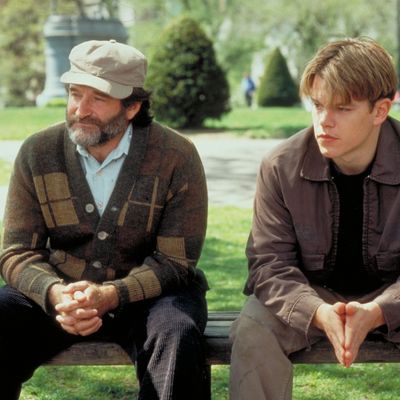
Get ready to feel old: This month marks the fifteenth anniversary of Good Will Hunting, the Oscar-nominated 1997 drama that made stars of Matt Damon and Ben Affleck and turbocharged the career of its director, Gus Van Sant. Damon and Van Sant have since reteamed for their new film Promised Land, though it’s a reunion that almost didn’t happen, since Damon was originally supposed to direct the script (which he cowrote with John Krasinski) himself. “I sort of hoped that something would go wrong and they’d ask me to direct it,” laughed Van Sant last night at a party for Promised Land at the Sunset Towers in Los Angeles. “And then they did!”
Though Van Sant and other stars of Promised Land were mingling at the party, the main attraction was Damon, who was so swarmed by partygoers and well-wishers that he was stuck in one corner of the room the entire night. To hear Damon tell it, that’s basically how it’s been since that long-ago December that Good Will Hunting came out. “Everything changed for us within the course of two months, everything was different,” he said. A man loomed nearby, holding a football he hoped Damon would sign. Meanwhile, a woman subtly angled her cameraphone to get Damon in the shot.
What did he learn then? “The weird thing about fame is that people say you change, but you actually don’t,” Damon said. “The world doesn’t change either — it just changes in its relationship to you. You walk into a room and suddenly the conversation stops because everybody looks at you. It’s a really weird thing because intellectually, you know that the important things are all the same — everything that mattered yesterday still matters today — but nobody treats you the same. You just need to recalibrate everything.”
Damon had been a jobbing actor for years before Good Will Hunting made him a movie star, and it’s hard to undersell how much of a media phenomenon the film became that season. With the help of producer Harvey Weinstein, Damon and Affleck turned up on every magazine cover in town, and Miramax eventually landed the film an impressive nine Oscar nominations, including Best Picture. Robin Williams would go on to take the Best Supporting Actor trophy, while Damon and Affleck scored a Best Original Screenplay win (which they accepted with memorable enthusiasm).
“I didn’t think it would be so successful,” said Van Sant. “I hoped that if we were lucky, it would do well, but I didn’t envision Oscars.” He paused, then admitted, “Well, there’s always a lottery ticket side of me that thinks ‘You might win,’ so it’s in your head, but you don’t expect it.”
In fact, the movie was the seventh biggest box office success of 1997, the sort of statistic reserved nowadays for comic book blockbusters and sequels. “Was it? Wow, that’s cool,” said Damon. “We were in the theaters with Titanic, and we kind of just drafted them. It didn’t follow any of the models that people were used to, so the box office every week just seemed like a surprise.”
When did Damon become aware that his little movie had become a monster hit? “I know I realized it when Harvey Weinstein called me and told me that we could get it to $150 million, but Robin had a deal — God, I love Robin — against 20 percent of the gross,” said Damon. “He was one of the biggest movie stars at the time, but he drastically reduced his fee and basically bet on the movie by saying, ‘After it reaches $60 million, I get an increasing percentage of the gross.’ And when they drew up the contract, Miramax was like, ’$60 million? If we can get to $60 million, that’d be amazing.’ And it made more than twice that!”
“They hit a point where, just mathematically, it cost more for Harvey to keep the ads in the papers and keep the movie in theaters than to just pull it and get more money on DVD and video. So Harvey called me and said, ‘We can keep it in [theaters], and we can definitely get the movie to $150 million, but I need you to call Robin and ask his permission to renegotiate the deal from this point on.’ And I was like, ‘Harvey, are you asking me to call the guy who not only got our movie made, but believed in it so much that he structured his entire deal around its success? There’s no way I’m making that phone call.’ And I didn’t, and Good Will Hunting made $138 million.” Damon laughed uproariously.
Thanks to Van Sant’s naturalistic approach, the movie still holds up today, fifteen years later. Well, all right … there is one thing that feels dated about it: Damon’s yellow-blond nineties haircut.
“You know, and I fought for that hair,” Damon admitted, groaning. “That is so my fault. For whatever weird reason at that age, I loved that haircut. Gus was like, ‘Really?’ Ben was like, ‘Really?’ If you look at Ben’s hair in that movie, it’s totally acceptable by today’s standards, but no, I wanted the frosted fuckin’ hair. I don’t know what my problem was. I looked like I should be singing backup for Color Me Badd.”




